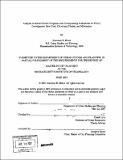| dc.contributor.advisor | Frank Levy. | en_US |
| dc.contributor.author | Hines, Shawntel B | en_US |
| dc.contributor.other | Massachusetts Institute of Technology. Dept. of Urban Studies and Planning. | en_US |
| dc.date.accessioned | 2008-01-10T16:04:19Z | |
| dc.date.available | 2008-01-10T16:04:19Z | |
| dc.date.copyright | 2007 | en_US |
| dc.date.issued | 2007 | en_US |
| dc.identifier.uri | http://hdl.handle.net/1721.1/39936 | |
| dc.description | Thesis (M.C.P.)--Massachusetts Institute of Technology, Dept. of Urban Studies and Planning, 2007. | en_US |
| dc.description | Includes bibliographical references (p. 63-64). | en_US |
| dc.description.abstract | Although many Americans assume that the education provided by public schools will prepare them for higher learning and/ or the workforce, recent studies have shown that American students' test scores lag behind their counterparts around the world and a growing number are not prepared for graduation. School choice, in the form of publicly funded vouchers for low-income students, has caused significant debate as a form of education reform. Proponents argue that vouchers will induce competition between schools, help low-income students obtain a better education, and increase parental satisfaction. Opponents of school vouchers argue that publicly funded vouchers will drain public schools of much needed resources, leave the most difficult to educate students in public schools, and violate the constitution by funding sectarian institutions. School voucher programs have been implemented in New York, Florida, Cleveland and Milwaukee yet there is no consensus in terms of the effect of vouchers on achievement scores. This thesis looks at four school choice programs, evaluates and compares the design/ methodologies of the program evaluations, and draws conclusion about which results are the most reliable and why. | en_US |
| dc.description.abstract | (cont.) Once the methodologies and findings of the evaluations were analyzed, I found that most programs did not have a significant effect on achievement test scores of voucher recipients and did not induce competition between public and private schools. | en_US |
| dc.description.statementofresponsibility | by Shawntel B. Hines. | en_US |
| dc.format.extent | 64 p. | en_US |
| dc.language.iso | eng | en_US |
| dc.publisher | Massachusetts Institute of Technology | en_US |
| dc.rights | M.I.T. theses are protected by copyright. They may be viewed from this source for any purpose, but reproduction or distribution in any format is prohibited without written permission. See provided URL for inquiries about permission. | en_US |
| dc.rights.uri | http://dspace.mit.edu/handle/1721.1/7582 | |
| dc.subject | Urban Studies and Planning. | en_US |
| dc.title | Analysis of school choice programs and corresponding evaluations for policy development : New York, Cleveland, Florida, and Milwaukee | en_US |
| dc.type | Thesis | en_US |
| dc.description.degree | M.C.P. | en_US |
| dc.contributor.department | Massachusetts Institute of Technology. Department of Urban Studies and Planning | |
| dc.identifier.oclc | 182806754 | en_US |
